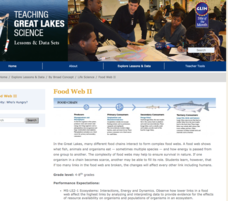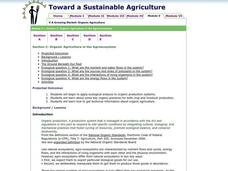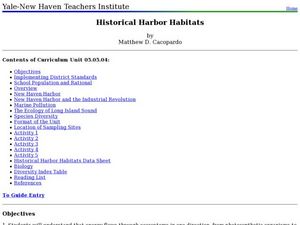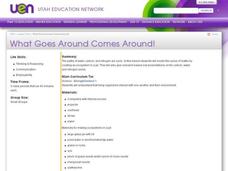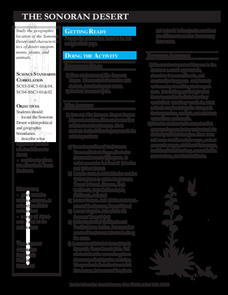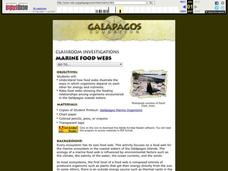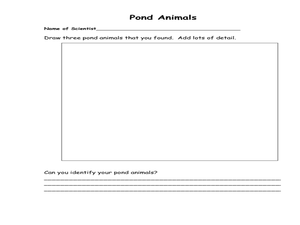Curated OER
Forest Food Chains and Webs
Students explore forest ecological systems. In this ecology lesson plan, students classify forest plants and animals according to their ecological roles. Students play a related vocabulary guessing game. Students choose a card on...
Michigan Sea Grant
Food Web II
A food web consists of complex food chains and the more complex the web, the better likelihood of survival. Learners compare and contrast food webs and food chains and discuss concepts like the predator-prey and consumer-producer...
Curated OER
Toward a Sustainable Agriculture
Students analyze organic production systems. In this organic agriculture lesson, students examine key organic practices for both crop and livestock. This lesson includes 5 different activities, 4 critical thinking questions and...
Curated OER
Historical Harbor Habitats
Tenth graders create food web displays in the classroom. In this ecology lesson, 10th graders identify the different pollutants in the environment and their effect on organisms. They collect samples of sediments from the harbor and...
Curated OER
Watershed Lesson Plan
Students are introduced to the concepts of a watershed, stream flow and water quality. This five-day plan is an excellent way to introduce students to the concepts involved. They create their own watershed using a paper bag, water and...
Curated OER
Ecology 5 - Carbon and Oxygen Cycles
Students construct their own diagrams outlining the pathway of carbon and oxygen in our atmosphere. They listen to a lecture on the carbon cycle while drawing an example of the carbon cycle on the board. Students comprehend that CO2 is...
Curated OER
Food Chains and Food Webs
Fourth graders study intertidal organisms and their role in the food web. In this food web lesson, 4th graders read the book The Sea That Feeds Us and discuss food webs. Students study pictures of intertidal creatures and discuss their...
Curated OER
Marine Protected Areas (MPA)
Ninth graders explain the purpose of MPA's. In this biology lesson plan, 9th graders identify MPA's in Southern California. They simulate coastal sampling using candy from two buckets. Students analyze their results and share it with the...
Curated OER
Habitat Art: Florida Panthers
Students discover the lifestyles of a Florida Panther by investigating its habitat. In this wild animal lesson, students utilize the Internet to research the habits of a Panther and what their habitat is. Students create an...
Columbus City Schools
Photosynthesis and Respiration
Thirty percent of the world's oxygen is produced by rainforests found throughout the world. Seventh grade learners explore the processes of photosynthesis and respiration through 10 days of labs, manipulatives, and discussions. They...
Curated OER
What Goes Around Comes Around!
Learners create an ecosystem in a jar to show a model of the water, carbon, and nitrogen cycle. Working in small groups, they research and present orally the information they find on this cycle.
Curated OER
Ecology
In this ecology instructional activity, students read information about ecology and the nine ecology subdivisions and answer comprehension questions. Students answer ten questions in this matching and fill in the blank instructional...
Curated OER
Food Web Mobile
Students explain the main concepts of food webs and food chains. They
describe the role of animals, plants, and other organisms in cycling energy and matter through a food web by creating mobiles. Lesson contains adaptations for all levels.
Curated OER
Food Web Follies
Seventh graders cut and paste animal pictures to create a food web and trace the path of energy. They write a paragraph explaining the importance of photosynthesis in all food webs.
Curated OER
Choose Your Defense: Spines, Vomit and Camouflage
Students investigate defensive mechanisms of insects and organisms. In this biology lesson, students draw imaginary caterpillars as well as imaginary parasites that will harm the caterpillar. Students utilize the Internet to...
Curated OER
The Sonoran Desert
Little learners examine a map of the southwestern United States and identify the Sonoran Desert. They locate different cities and rivers, determining whether or not each is found within this special ecosystem. A student handout is...
Curated OER
Biome-Ecology Unit with a "Design a Zoo" Extension
Students participate in a three part unit about biomes. Part one, students research the biomes of North America and part two consists of research on zoos and a field trip to a zoo. While part three ties together the first two when...
Curated OER
Constructing A Food Web
Students identify and explain the relationships within a food web. They use index cards to glue pictures of producers and consumers. On the back of the card, students name the organism, list the type of biome in which it is found.
Curated OER
Predator and Prey Game
Students explore the why the balance among producers, predators and prey is necessary in order for an ecosystem to be sustained over time. Through web games and activities, they discover how each component of the food chain works to...
Curated OER
Marine Food Webs
Students examine how food webs illustrate the ways in which organisms depend on each other for energy and nutrients, and make food webs showing the feeding relationships among organisms encountered in the Gal??pagos coastal waters.
Curated OER
Heat Misconceptions
Third graders determine that gloves do not provide heat, but rather, they insulate or hold in any heat that is in their hand. They discuss the different temperatures found in ecosystems around the world. What do animals that live in...
Curated OER
Trail Adventure
Young scholars create a trail with numbered specimens. Students complete an accurate and functional interactive trail activity brochure. They complete a web page tree identification guide and interactive identification activity. Young...
Curated OER
Connect the Species
Fourth graders, in pairs, explore energy transfer and species interrelationships by viewing slides on a microscope. hey explore phytoplankton (producers) and zooplankton (consumers)
Curated OER
Pond and Pond Organisms
Learners explore pond ecosystems. In this pond organism activity, students will use pond water and a plastic bad in order to locate and identify freshwater organisms. The activity is designed for younger grades, but...



